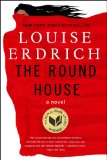Summary | Excerpt | Reading Guide | Reviews | Beyond the Book | Readalikes | Genres & Themes | Author Bio

A Novel
by Louise ErdrichChapter One
1988
Small trees had attacked my parents’ house at the foundation. They were just seedlings with one or two rigid, healthy leaves. Nevertheless, the stalky shoots had managed to squeeze through knife cracks in the decorative brown shingles covering the cement blocks. They had grown into the unseen wall and it was difficult to pry them loose. My father wiped his palm across his forehead and damned their toughness. I was using a rusted old dandelion fork with a splintered handle; he wielded a long, slim iron fireplace
poker that was probably doing more harm than good. As my father prodded away blindly at the places where he sensed roots might have penetrated, he was surely making convenient holes in the mortar for next year’s seedlings.
Whenever I succeeded in working loose a tiny tree, I placed it like a trophy beside me on the narrow sidewalk that surrounded the house. There were ash shoots, elm, maple, box elder, even a good-sized catalpa, which my father placed in an ice cream bucket and watered, thinking that he might find a place to replant it. I thought it was a wonder the treelets had persisted through a North Dakota winter. They’d had water perhaps, but only feeble light and a few crumbs of earth. Yet each seed had managed to
sink the hasp of a root deep and a probing tendril outward.
My father stood, stretching his sore back. That’s enough, he said, though he was usually a perfectionist.
I was unwilling to stop, however, and after he went into the house to phone my mother, who had gone to her office to pick up a file, I continued to pry at the hidden rootlings. He did not come back out and I thought he must have lain down for a nap, as he did now sometimes. You would think then that I would have stopped, a thirteen-year-old boy with better things to do, but on the contrary. As the afternoon passed and everything on the reservation grew quiet and hushed, it seemed increasingly important to me that each one of these invaders be removed down to the very tip of the root, where all the vital growth was concentrated. And it seemed important as well that I do a meticulous job, as opposed to so many of my shoddily completed chores. Even now, I wonder at the steepness of my focus. I wedged my iron fork close as I could along the length of the twiglike sprout. Each little tree required its own singular strategy. It was almost impossible not to break off the plant before its roots could be drawn intact
from their stubborn hiding place.
I quit at last, sneaked inside, and slipped into my father’s study. I took out the law book my father called The Bible. Felix S. Cohen’s Handbook of Federal Indian Law. It had been given to my father by his father; the rust red binding was scraped, the long spine cracked, and every page bore handwritten comments. I was trying to get used to the old-fashioned language and constant footnotes. Either my father or my grandfather had placed an exclamation point on page 38, beside the italicized case, which had naturally interested me also: United States v. Forty-three Gallons of Whiskey. I suppose one of them had thought that title was ridiculous, as I did. Nevertheless, I was parsing out the idea, established in other cases and reinforced in this one, that our treaties with the government were like treaties with foreign nations. That the grandeur and power my Mooshum talked about wasn’t entirely lost, as it was, at least to some degree I meant to know, still protected by the law.
I was reading and drinking a glass of cool water in the kitchen when my father came out of his nap and entered, disoriented and yawning. For all its importance Cohen’s Handbook was not a heavy book and when he appeared I drew it quickly onto my lap, under the table. My father licked his dry lips and cast about, searching for the smell of food perhaps, the sound of pots or the clinking of glasses, or footsteps. What he said then surprised me, although on the face of it his words seem slight.
From The Round House by Louise Erdrich Copyright © 2012 by Louise Erdrich. Reprinted courtesy of Harper, an imprint of HarperCollins Publishers.
Your guide toexceptional books
BookBrowse seeks out and recommends the best in contemporary fiction and nonfiction—books that not only engage and entertain but also deepen our understanding of ourselves and the world around us.